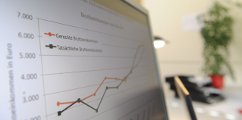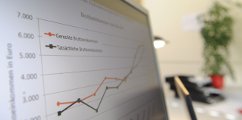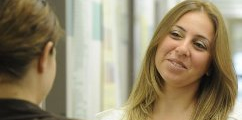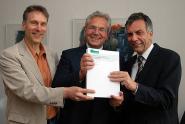Whether fat or thin, male or female, young or old – people are different. Alongside their physical features, they also differ in terms of nationality and ethnicity; in their cultural preferences, lifestyles, attitudes, orientations, and philosophies; in their competencies, qualifications, and traits; and finally in their professions. However, how do such heterogeneities lead to social inequalities? What are the underlying social mechanisms? These are the questions being pursued by the new Collaborative Research Centre (CRC) “From heterogeneities to social inequalities” at Bielefeld University that was approved by the German Research Foundation (DFG) on 25 May.
Research on inequality in the social sciences is dispersed across different specialized research fields such as education, the labour market, equity, migration, health, or gender. One goal of the CRC, which has been assigned the number 882, is to integrate these fields and search for common mechanisms in the emergence of inequality that can be compiled into a typology. A total of 15 professorships and the Bielefeld University library are involved in the CRC. Alongside sociologists, it links together scientists from the Faculties of Business Administration and Economics, Educational Science, Health Science and Law in Bielefeld, as well as the German Institute for Economic Research in Berlin and the University of Nürnberg-Erlangen. The DFG is granting 8.4 million Euros over an initial 4-year period commencing on the 1st of July. New posts will be announced for more than 40 doctoral and postdoctoral students as well as non-scientific staff. In addition to carrying out research, the promotion of young academics is a central concern. Therefore, the CRC will be setting up its own integrated Research Training Group to provide doctoral training. In addition, a data infrastructure project is being launched to archive, prepare, and deliver the data being gathered.
The speaker of the new CRC is the sociologist Professor Dr. Martin Diewald (social inequality and stratification). Together with his colleague and deputy, Professor Thomas Faist PhD (transnationalization, development and migration) and other colleagues, he has been working on the research proposal for more than 3 years.
"We are very pleased to see such confidence being placed in our work", says Professor Dr. Martin Diewald. "It's taken a lot of hard work to get this far. Now, we can finally begin with the real task. Over the last few years, I have invested a great deal of my energy to arrive at this point. When it comes down to it, the topic is not just of scientific significance, but also possesses a major and, to all appearances, ever-increasing relevance for society as a whole. There is a strong public interest in reputable analyses in this field. We are striving to forge close links between theory formulation and empirical studies as well as a sustained strategy of data production and dissemination. We hope that this approach will go beyond the topics of the CRC and set examples for the development of the disciplines involved."
"For the Faculty of Sociology, the approval of this Collaborative Research Centre is a great success that pleases us enormously", adds Professor Dr. Veronika Tacke, the Dean of the Faculty of Sociology. "Ever since it was founded 40 years ago, the Bielefeld Faculty of Sociology has stood out through its unique combination of sociological theory formulation and empirical research. In many ways, it has contributed decisively to shaping the research landscape in the social sciences. I am confident that the CRC will contribute to underlining and increasing the future significance of sociology in Bielefeld on both a national and international level. I congratulate all the scientists involved and wish them every success with the research projects they are now beginning."
"A Collaborate Research Centre is a sign of excellent research – there are currently five CRCs at Bielefeld University, and it signifies a particularly strong research profile in a university of this size", Professor Dr.-Ing. Gerhard Sagerer explains. "With this CRC, Bielefeld's social scientists, and the sociologists at their fore, once again confirm their international status. This Collaborative Research Centre strengthens one of the central features of our research profile. I heartily congratulate Professor Diewald and all the scientists involved. I thank all those involved for their commitment."
Sociology at Bielefeld already possesses one outstanding scientific institution with the Bielefeld Graduate School in History and Sociology set up together with the History Department as part of the Excellence Initiative. In addition, the cluster proposal broadly initiated by sociologists and historians entitled Communicating comparisons. From the onset of modernity to world society has also reached the final round in the Excellence Initiative of the Federal and State governments. Bielefeld University will be submitting the full proposal in September.
A total of 21 new Collaborative Research Centres have been approved by the DFG to start research on the 1st of July.
With the CRC 'From heterogeneities to Inequalities', Bielefeld University now has a fifth Collaborative Research Centre. The other Collaborative Research Centres are:
- "The Political as Communicative Space in History " (CRC 584, since 2001),Faculty of History, Philosophy and Theology; Faculty of Linguistics and Literary Studies; Faculty of Law; Faculty of Sociology
- "Physics of Single Molecule Processes and Molecular Recognition in Organic Systems"(CRC 613, since 2002), Faculty of Physics, Faculty of Chemistry, and Faculty of Biology
- "Spectral Structures and Topological Methods in Mathematics" (SFB 701, since 2005), Faculty of Mathematics
- "Alignment in Communication" (SFB 673, since 2006),Faculty of Linguistics and Literary Studies, Faculty of Technology
And it is also participating in a further CRC:
- "Model Based Control of Homogenized Low-Temperature Combustion " (SFB 686, since 2006 at the RWTH Aachen), Faculty of Chemistry
Collaborative Research Centres are long-term research institutes established at institutes of higher education in which scientists work together within the framework of an interdisciplinary research programme. They are funded by the German Research Foundation. Collaborative Research Centres facilitate scientifically ambitious, complex, and long-term research by concentrating and coordinating the existing resources at a single institute of higher education. Promoting young academics and gender equality are two of the special goals of a Collaborative Research Centre. Funding is generally for a total of up to 12 years, with each period of funding lasting 4 years.
Contact:
Professor Dr. Martin Diewald, Universität Bielefeld
Speaker of CRC 882 "From heterogeneities to social inequalities"
Faculty of Sociology
Telephone: 0521 106-4309
Email: martin.diewald@uni-bielefeld.de













